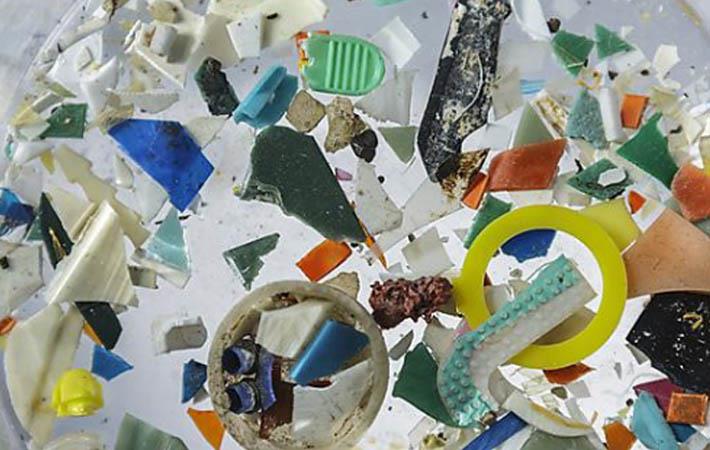Interviews
UK team studying impact of tyres, clothing on marine life
12 May '18
3 min read

Courtesy: University of Plymouth
Scientists from the University of Plymouth are studying the impact of tyres and clothing on the marine environment. The project will build on the research already underway on marine plastic pollution and the impact of human activities on the marine environment. It will be used to set future policy priorities as the government fights the scourge of plastics.
Environment Minister Thérèse Coffey has pledged £200,000 to explore how tiny plastic particles from tyres, synthetic materials like polyester, and fishing gear – such as nets, ropes and lines – enter the waterways and oceans, and the impact they have on marine life.
Following the government’s ban on microbeads, this comprehensive research will be used to improve the scientific understanding of how microplastics from other sources enter the oceans – whether through fibres released into waste water during a washing cycle, or car tyre friction on roads creating a dust of particles that make their way into the seas through sewers.
The 11-month project will build on research already underway, with some scientists estimating tyres contribute 270,000 tonnes of plastics per year while a study by the university has shown a single wash load of acrylic clothing could release over 700,000 microfibres into the ocean.
Speaking at the National Oceanographic Association’s annual conference in London, environment minister Thérèse Coffey said: “The impact of plastic pollution on our oceans is one of the greatest environmental challenges of our generation. The UK is already leading the way in this area, but we want to go further – and faster. But we can only act where there is robust evidence, and through this exciting project we will build on work underway to better understand how microplastics end up in marine environment and what we can do to tackle this in the future.”
The research project is being led by Professor Richard Thompson OBE, head of the International Marine Litter Research Unit at the University.
He oversaw Defra’s first research project on microplastics and their impact on the marine environment, which led to the UK’s pioneering ban on microbeads in rinse-off cosmetics and personal care products coming into force this year.
It will also build on a previous study by the university, which identified a single load of washing can release up to 700,000 fibres into the marine environment, by identifying the quantities of synthetic fibres and textiles released through storm water runoff, combined sewage overflows, treated effluent and airborne transport.
Thompson said: “The types of microplastics entering the marine environment are incredibly diverse, but recent estimates in Norway and Sweden have suggested that particles of tyre and debris from the road surface could be a substantial source. With very limited real data available to confirm the impact from these sources, there is a genuine and pressing need to establish the true scale of this issue. By combining this with an assessment of the quantities of microplastic from synthetic textiles, we can develop a more complete picture on the relative importance of various sources. We will be able to use our findings to work with the government, scientists and industry to try to prevent these particles entering the marine environment in the future.” (SV)
Environment Minister Thérèse Coffey has pledged £200,000 to explore how tiny plastic particles from tyres, synthetic materials like polyester, and fishing gear – such as nets, ropes and lines – enter the waterways and oceans, and the impact they have on marine life.
Following the government’s ban on microbeads, this comprehensive research will be used to improve the scientific understanding of how microplastics from other sources enter the oceans – whether through fibres released into waste water during a washing cycle, or car tyre friction on roads creating a dust of particles that make their way into the seas through sewers.
The 11-month project will build on research already underway, with some scientists estimating tyres contribute 270,000 tonnes of plastics per year while a study by the university has shown a single wash load of acrylic clothing could release over 700,000 microfibres into the ocean.
Speaking at the National Oceanographic Association’s annual conference in London, environment minister Thérèse Coffey said: “The impact of plastic pollution on our oceans is one of the greatest environmental challenges of our generation. The UK is already leading the way in this area, but we want to go further – and faster. But we can only act where there is robust evidence, and through this exciting project we will build on work underway to better understand how microplastics end up in marine environment and what we can do to tackle this in the future.”
The research project is being led by Professor Richard Thompson OBE, head of the International Marine Litter Research Unit at the University.
He oversaw Defra’s first research project on microplastics and their impact on the marine environment, which led to the UK’s pioneering ban on microbeads in rinse-off cosmetics and personal care products coming into force this year.
It will also build on a previous study by the university, which identified a single load of washing can release up to 700,000 fibres into the marine environment, by identifying the quantities of synthetic fibres and textiles released through storm water runoff, combined sewage overflows, treated effluent and airborne transport.
Thompson said: “The types of microplastics entering the marine environment are incredibly diverse, but recent estimates in Norway and Sweden have suggested that particles of tyre and debris from the road surface could be a substantial source. With very limited real data available to confirm the impact from these sources, there is a genuine and pressing need to establish the true scale of this issue. By combining this with an assessment of the quantities of microplastic from synthetic textiles, we can develop a more complete picture on the relative importance of various sources. We will be able to use our findings to work with the government, scientists and industry to try to prevent these particles entering the marine environment in the future.” (SV)
Fibre2Fashion News Desk – India
Popular News
Leave your Comments
Editor’s Pick
Therese Premler-Andersson
Textile Machinery Association of Sweden (TMAS)
Dr. Michael Duetsch & Man Woo Lee
UPM Biochemicals and Dongsung Chemical
Dr. Sameer Sood
National Institute of Fashion Technology
































-Ltd..jpg?tr=w-120,h-60,c-at_max,cm-pad_resize,bg-ffffff)





.jpg?tr=w-120,h-60,c-at_max,cm-pad_resize,bg-ffffff)
.jpg?tr=w-120,h-60,c-at_max,cm-pad_resize,bg-ffffff)






